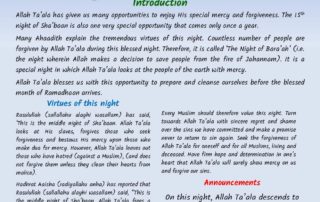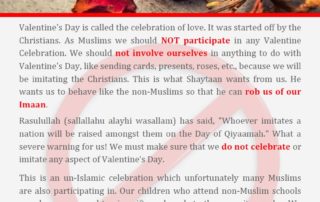The Taraweeh of Hadhrat Moulana Yahya (RA)
Taken from Akaabir ka Ramdhaan of Hadhrat Shaikh Zakariyya (rahmatullahi alayh)
Hadhrat Shaikh Zakariyya (rahmatullahi alayh) has written the following about his father Moulana Yahya (rahmatullahi alayh).
My late father on many occasions mentioned to us the following story, “During the last Ramadhaan of Hadhrat Ml Rasheed Ahmad Gangohi (rahmatullahi alayh), I led the Taraaweeh Salaah for him and his attendants. It so happened that because of some reason or the other, Hadhrat’s son, Hakeem Mas’ood was unable to perform Taraaweeh.” For quite some days before the commencement of Ramadhaan Hadhrat (rahmatullahi alayh) said, “Mas’ood Ahmad is reluctant and not able to lead the Taraaweeh Salaah. Who is going to recite the Qur-aan for us in Taraaweeh?” On every occasion, I wanted to offer my services and declare my readiness, but out of respect, I refrained from doing so. Two days before Ramadhaan Hadhrat (rahmatullahi alayh) said, “Molvi Yahya Saheb! You are also a Haafiz of the Qur-aan?” I replied, “Yes Hadhrat, I am indeed. However, I recite the Quran in a Persian tone. You are used to hearing the recitation of Hakeem Mas’ood Ahmad Saheb, who is indeed a fine Qaari.” Hadhrat (rahmatullahi alayh) replied, “No, I have already heard your recitation. You shall lead us in Taraaweeh.” My father says, “On the first day it was a great burden for me. By way of preparation, I had to recite one and a quarter para of the Qur-aan by looking into the Qur-aan. I had memorised the Qur-aan at the age of seven. Thereafter for six months, I had to look into the Qur-aan Shareef and daily recite one full khatam. Since then I have never looked into the Qur-aan to recite it. The first day, in order to prepare myself properly, I recited one and a quarter para from the Qur-aan, but from the second day onwards the fear, nervousness and anxiety disappeared. Thereafter there was no further need for me to look into the Qur-aan and read.”
My late father (May Allah fill his qabr with noor) was indeed a very good Haafiz with tremendous energy to recite the Qur-aan Shareef by heart. He had a bookshop where he himself made up the parcels to be posted and wrote the addresses himself. While doing that he was all the time reciting the Qur-aan Shareef in an audible fashion without ever becoming confused or struggling over the ‘mutashaabihaat’.
Moulana ‘Aashiq Ilaahi (rahmatullahi alayh) writes about him in Tazkiratul-e-Khaleel, “Once, upon my request he was invited to Meerut to lead the Taraaweeh Salaah and recite the Qur-aan Shareef in Ramadhaan. I saw that wherever he went, he was all the time busy reciting by himself so that he finished a whole khatam daily. When it was time for Iftaar, he was reading, “Qul a’oozu birabbin Naas…” When he arrived by rail at Meerut it was Esha time. Being a man who was continuously in a state of wudhu, he entered the Masjid and immediately proceeded to the musalla to lead the Salaah. In three hours, he recited ten paras clearly without any struggle in the difficult parts as if the Qur-aan Shareef was an open book in front of him. So comfortable was his pace of recitation, that he completed a full khatam of the Qur-aan in three nights and departed. So good a hafiz was he that there was no need to revise his reading beforehand neither was there any need for someone to stand behind him and listen with the intention to correct if needed.”
My father also used to say about this visit to Meerut, “When the word got around in Meerut that a certain man was coming to complete a full khatam of the Qur-aan in Salaah within three days, thirty or forty Huffaaz arrived from far and wide to stand behind him and test him.”
My late father never had trouble with fear in Ramadhaan like myself. On the invitations and insistence of friends, he often went to their places to finish a khatam in two or at the most three nights before returning home. In Masaajid, he generally did it in three nights and in other ibaadat-khanas he generally did so in two or even in one night. Once on the invitation of the late Shah Zaahid Husain he completed a khatam at Shah Saheb’s house in two nights.
I can still remember his recitation in the Nawab-wali Masjid in Delhi. Molvi Naseeruddin was busy performing Taraaweeh in the Hakeem Ishaq Masjid. At that time, my father arrived in Delhi from somewhere. He went to rest a little in the resting place of Hakeem Ishaq attached to the Masjid. It so happened that Molvi Naseeruddin was reciting the 14th para and he was making mistakes. He had to be corrected time and again. My father went into the Masjid and as soon as Molvi Naseeruddin made the next salaam, he asked him to move from the spot, and he himself took over. In the next sixteen rakaats he recited sixteen paras. No doubt, the musallis must have found it tiring and exhausting. However, it is a fact that people are more pleased with finishing the Qur-aan Shareef quickly than they are worried about a bit of hardship. To have been able to finish the Qur-aan on the 12th night made them forget their exhaustion.
I can also remember his recitation of the Qur-aan in the house of Ummi Bi in Kandhla. She is Amatur Rahmaan, the daughter of Moulana Muzaffar Hussain, my father’s Nani (maternal grandmother) who was known as Ummi Bi. In answer to her special request, he remained reciting the Qur-aan Shareef throughout the night in Nafl Salaah. Because of the fact, that according to the Hanafis it is not permissible to have more than four muqtadees in Nafl Salaah, the ladies behind him had to be changed continuously, while my father continued reciting.
My late uncle (Moulana Ilyaas rahmatullahi alayh) also used to visit Kandhla in Ramadhaan because of Ummi Bi. In those days, the Qur-aan khatam used to be completed in a single night. At those times, he performed Esha Salaah in the Masjid and thereafter go to the house of Ummi Bi to perform Taraaweeh there from after Esha until Sehri time, thereby completing fourteen or fifteen paras.
Maulana Raooful Hasan Saheb is the maamoo (maternal uncle) of my late father and the father of my late wife. On the 30th Ramadhaan he recited from Alif Laam Meem until Qul a’oozu bi rabbil falaq… in one single rakaat and in the second rakaat he recited only Surah Naas! Then at Sehri time, he told his mother, Ummi bi, “I have now performed two rakaats, will you now perform the other eighteen?” During that time, his mother listened to the Qur-aan Shareef whilst standing behind him in Salaah!




